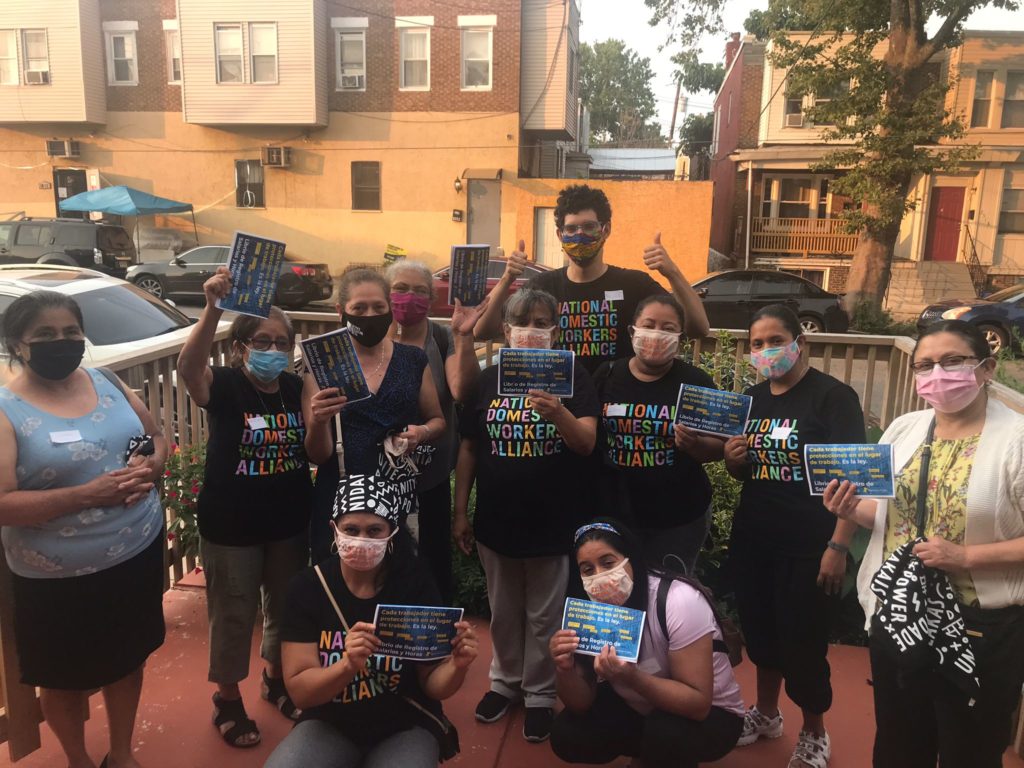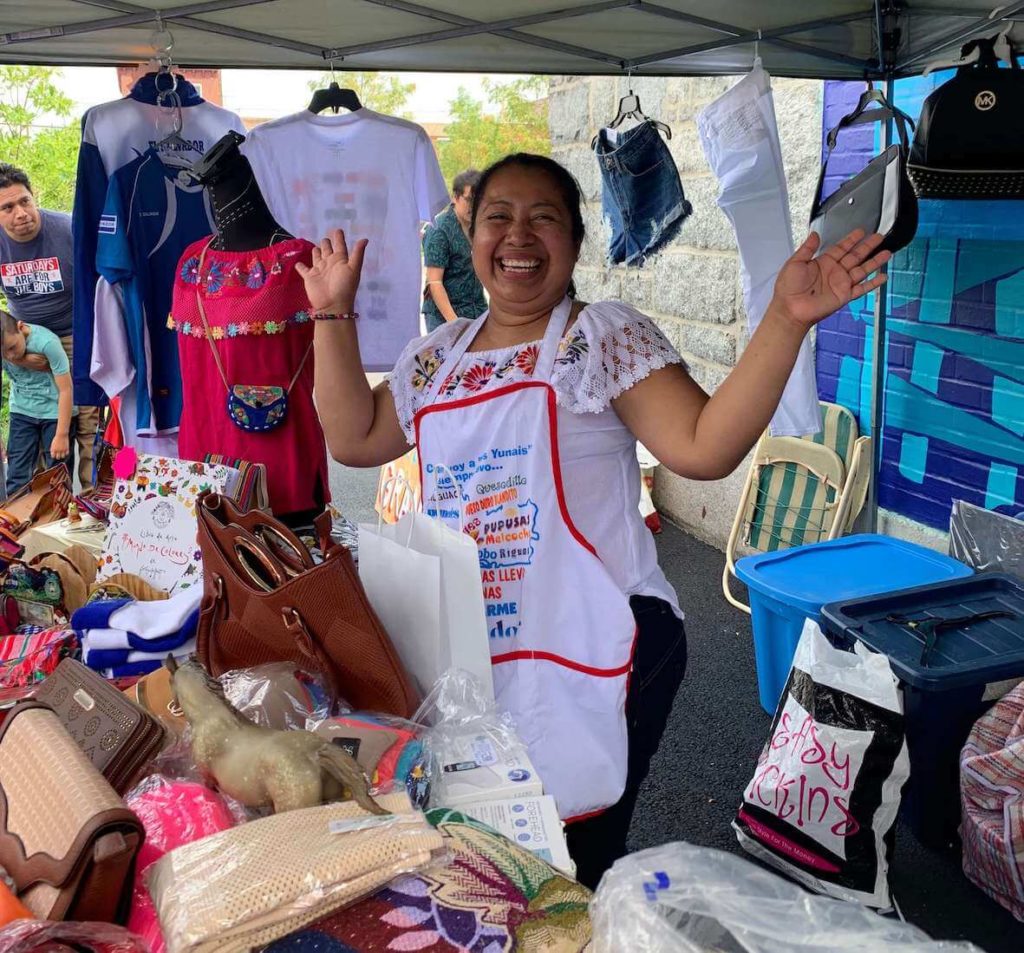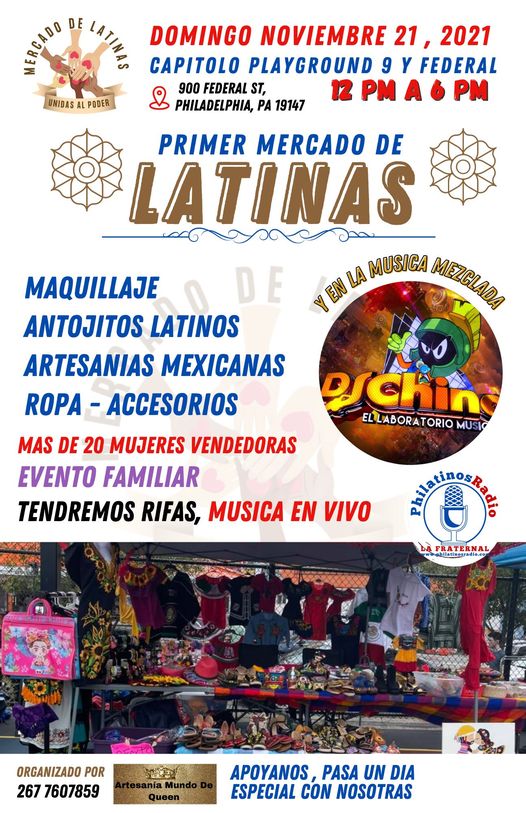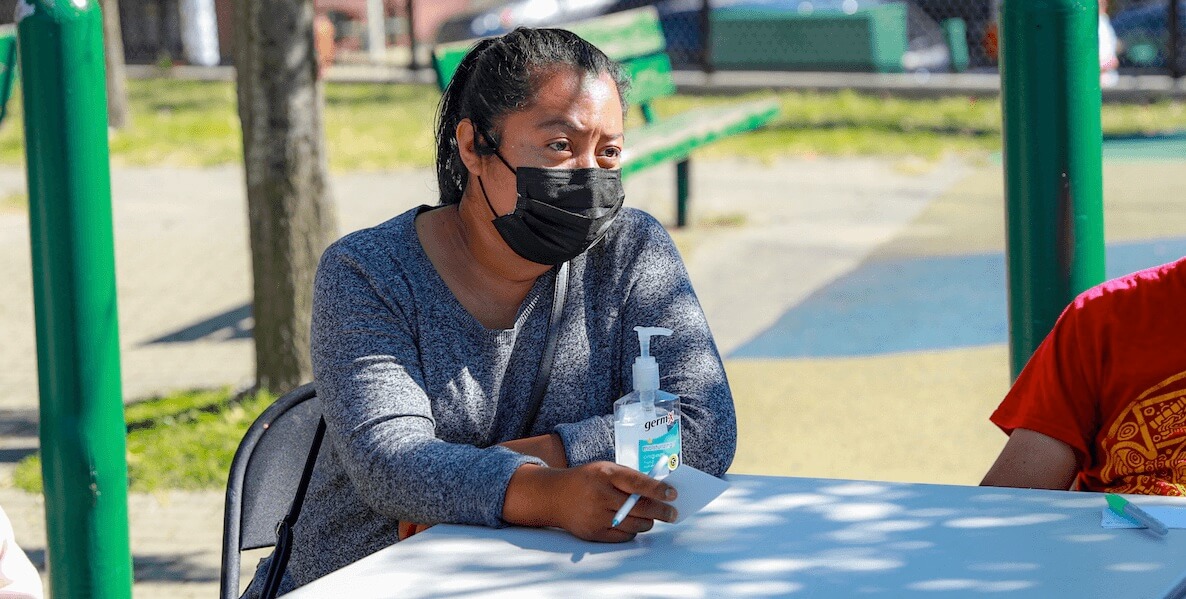As Zulma Guzman walks down a side street a few blocks off Woodland Avenue, Elmwood Park’s main drag, she points at each rowhouse: “Honduras … El Salvador, El Salvador … Guatemala,” she says, naming where each family emigrated from. Some families are her customers—they buy the Salvadoran pupusas she makes on weekends — and many she has known since they came to Philly and she helped them acclimate to a new life here.
Guzman describes herself as a “trabajadores social sin titulo” — a social worker without a title. On a given day, she could be seeking out health care for a mom and her kids; connecting a young student with English classes; packing up food and clothing donations to distribute; or showing a recent arrival how to navigate the city by bus.
Lea este artículo en español aquí
Guzman, who came to Philadelphia from El Salvador in 2009, is a buoyant, bubbly woman — quick to let out a belly laugh — and one of those people who effuses warmth and capability. And in southwest Philly, especially within the Central American immigrant community, people know her. In the half hour we toured her neighborhood, her phone rang about every 10 minutes and she often paused to respond to a text.
It’s a nonstop, full-time, unpaid “job” that she juggles while also cleaning houses, making and selling pupusas and volunteering with organizations like The Philadelphia AIDS Consortium and Alianza.
“For folks who have more resources and are not subject to so much systemic marginalization, there are structures set up to help people,” Reisman adds. “And in these communities, instead it’s networks of people like Zulma.”
It all started when her husband asked her to help a few friends coming up from Guatemala register their kids for school. She’d recently gone through the process with her own kids — who were 5, 7 and 13 when they arrived from El Salvador—at Catharine Elementary School in Elmwood Park. The paperwork was daunting and complicated, but she’d figured it out — and she helped another family through it.
During the school year, she’d talk to other moms at drop-off, seeking out recent arrivals, exchanging numbers and getting to know them, she says. “People started giving out my number and then they’d call and say, ‘You’re the lady that helps register people!’” she laughs, “And that’s how I started becoming famous.”
When Nely Hernández’s nephews moved to Philly from Honduras, Zulma helped her register them for high school. “She even went to the district with me,” remembers Hernández. “I didn’t even know how to ride buses, so she was like ‘Alright we’re going to get up at this time in the morning and take these two buses together.’”
RELATED: Local collaboration seeks to boost Latinx businesses in North Philly
It is, of course, incredibly difficult to navigate new systems in an unfamiliar country—especially when signage isn’t bilingual or translation services aren’t available. Like filling out school registration paperwork, there are hundreds of day-to-day challenges to overcome. “How to get to a doctor’s appointment that’s really far away from you; how to find a doctor; what to do when someone has a problem or someone has an injury and they need help,” says Leah Reisman, health and wellness director at Puentes de Salud, who works with Guzman.
“For folks who have more resources and are not subject to so much systemic marginalization, there are structures set up to help people,” Reisman adds. “And in these communities, instead, it’s networks of people like Zulma.”

Helping her community thrive
After our walk through the southwest Philly neighborhood Elmwood Park, Guzman and I wound up back in the plaza parking lot where we started. We looked around for a place to sit and talk. Many storefronts in the plaza are vacant — Dunkin Donuts was closing for the day. I asked if there was a park close by and Guzman shook her head. I scanned the sidewalk for a bench. No dice.
“When I’m the mayor, I’ll put chairs and benches here,” Guzman said and laughed as we settled on the narrow frame of a wooden planter flanking the entrance to the parking lot.
She’s thought a lot about how her community could be better supported—Spanish-speaking staff (or translators) at the neighborhood banks; markets that sell more Central American foods. And top on her list? Jobs — especially for women. “There are so many people coming here with so many skills,” she says.
RELATED: Proyecto Tamal sells tamales to raise money for immigrant chefs
Like making delicious food, for example. Guzman can bang out 300 pupusas — a pocket of masa stuffed with all different kinds of deliciousness and cooked on a griddle — on a Friday, which she delivers to her customers around the neighborhood. Her most popular is stuffed with chiccharón, beans and cheese, which she packs up with curtido (pickled cabbage slaw) and salsa.
And she helps other women make money this way, too. “There are so many cultural foods,” she says — like tamales, thick tortillas (different than the ubiquitous-in-Philly Mexican-style tortillas), pupusas, chicken tajadas. “I motivate them to make the food that they know.”
Many of these women are her neighbors, and some approach her for help. “Bring it over, let’s taste it,” she tells them. “If it’s good, I’ll help you sell.”
She connects them with catering opportunities — birthday parties, baby showers and other special events — by word of mouth. She often passes on orders she doesn’t have time to make. And recently, she’s helped organize a series of Mercado de Latinas — events throughout the city with more than 20 women vendors selling their wares.

This type of support is especially crucial now, as Latinx Philadelphians have been hit especially hard by the pandemic. They have been hospitalized at nearly twice the rate of White Philadelphians and also suffered devastating economic hardships.
“Folks like Ivonne and Zulma help us make sure that we can continue to play the unique role that we are qualified to play,” says Reisman. “They welcome us; help us build and maintain our legitimacy, reach people who could benefit from the work that we do and learn how to do our work better.”
During the first two months of the pandemic, Puentes de Salud, the lauded non-profit that provides high-quality health care, innovative educational programs, and community building in Philly’s Latinx immigrant population, surveyed 833 of the primarily undocumented folks they serve. They found that for 89 percent of respondents, one or more household members had lost their job or had hours reduced. For 54 percent of respondents, their household had lost all sources of income due to the pandemic. And 71 percent of respondents said they had or planned to access free food from a distribution site.
Of course Guzman was busy helping on that end, too. Three times a week during the height of the pandemic (which happened to be just after she got her driver’s license), she’d pick up study guides from area schools, fill her car with food boxes provided by local organizations and deliver them to families in her community.
That’s how Guzman met Reisman at Puentes de Salud — through another community leader, Ivonne Pinto Garcia.
RELATED: An Immigrant Alphabet project helps bring immigration stories to life
“Folks like Ivonne and Zulma help us make sure that we can continue to play the unique role that we are qualified to play,” says Reisman. “They welcome us; help us build and maintain our legitimacy, reach people who could benefit from the work that we do and learn how to do our work better. And, they also bring a lot of love and positivity to the work.”
Reisman would like to see people like her compensated for the work they do. “They are professionals,” she says. “They have skills and abilities that we do not have.” And, she points out, they operate in communities that are often invisible to the City of Philadelphia.
“We support each other — emotionally and spiritually.”
Keeping in mind that (because of the unknown percentage of undocumented immigrants) any statistics are a mere approximation, the total Central American-born population in the United States has grown more than tenfold since 1980 (just after the civil war began in El Salvador), and by 24 percent since 2010. These immigrants are mostly (roughly 86 percent in 2019) from the northern triangle—Guatemala, Honduras and El Salvador.
 In Philly, Camden and Wilmington, there were approximately 27,000 immigrants from Central America (excluding Mexico) in 2015-2019. Here in Philly, according to recent census data, the Hispanic population has grown 36 percent in the past 10 years.
In Philly, Camden and Wilmington, there were approximately 27,000 immigrants from Central America (excluding Mexico) in 2015-2019. Here in Philly, according to recent census data, the Hispanic population has grown 36 percent in the past 10 years.
Guzman — like so many immigrants from Central America — left El Salvador because of poverty and war, she says. Her dad had been in Philly for 10 years and petitioned for her to emigrate. When she arrived in 2009, “It was hard,” she says. “I already had three kids and I had to leave them. I didn’t know any English.” For two and a half years, she saved money and petitioned for her kids to be able to join her. And everything she figured out for them — how to register them for school, get a physical, find English lessons and so much more — she’s consistently passing on to mothers in her community.
“I like that I learn how to navigate all these systems,” says Guzman. “And at the end of the day, fight for someone else.”
Like Hernández, who came to Philly from Honduras in 2010. The two women met scanning the shelves at a neighborhood Dominican market. “I had just gotten here and was going to pick up some groceries,” says Hernández. “I remember seeing this woman in a cap and we were next to each other trying to get something from a high shelf.” She was picking up soda and tortillas; Guzman was looking for pepper. They exchanged numbers and have been in touch since—supporting each other in many ways.
Now, Guzman calls her when she has too much on her plate. Hernández often helps mothers with paperwork for health insurance for their kids — a service she once spent $50 on. “I was watching very closely how she did it and I never paid again,” she says. “Now people send me all these pictures of their paperwork—how do I do this? What is this?” she laughs. Along with her 10-year old daughter who helps translate, “I help a lot of people for free.”
Helping people is in Guzman’s blood; her grandmother played a similar role in her community back in San Salvador. “Grandma was a very generous person who a lot of people knew,” Guzman says. She also did her “social work” informally, opening up her home to feed people, help connect them with jobs.
RELATED: Artist-activist Michelle Angela Ortiz works to empower local immigrants
Still, the reality is, the work is draining. I asked Guzman what motivates her—what keeps her going.
“A lot of times I ask myself this question,” she laughs. “When I’m at home and my phone is constantly going off, sometimes my husband tells me, shut the office down. I sometimes feel like a psychologist because people come to me with problems and I feel responsible to do something about it. And it never stops.”
She’s not the only person who does this work in Philly. “There are more women like me in other parts of the city,” she says. “We stay in touch and support each other — emotionally and spiritually.”
Their work is intense—handling crises; being the go-to person for folks who don’t have many other people to call; knowing that at all times, someone could use your help is a weighty responsibility. But Guzman says she gets a lot from it, too. “I like that I learn a lot — from the people, from the community,” she says. “I like that I learn how to navigate all these systems and at the end of the day, fight for someone else.”
Editor’s note: Interviews with Guzman and Hernández were conducted with translation by Ana Caballero.
The Citizen is one of 20 news organizations producing Broke in Philly, a collaborative reporting project on solutions to poverty and the city’s push towards economic mobility. Follow the project on Twitter @BrokeInPhilly.
![]()
RELATED
Header photo of Zulman Guzman by Manuel Vasquez




